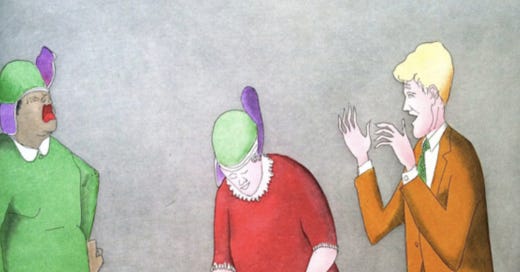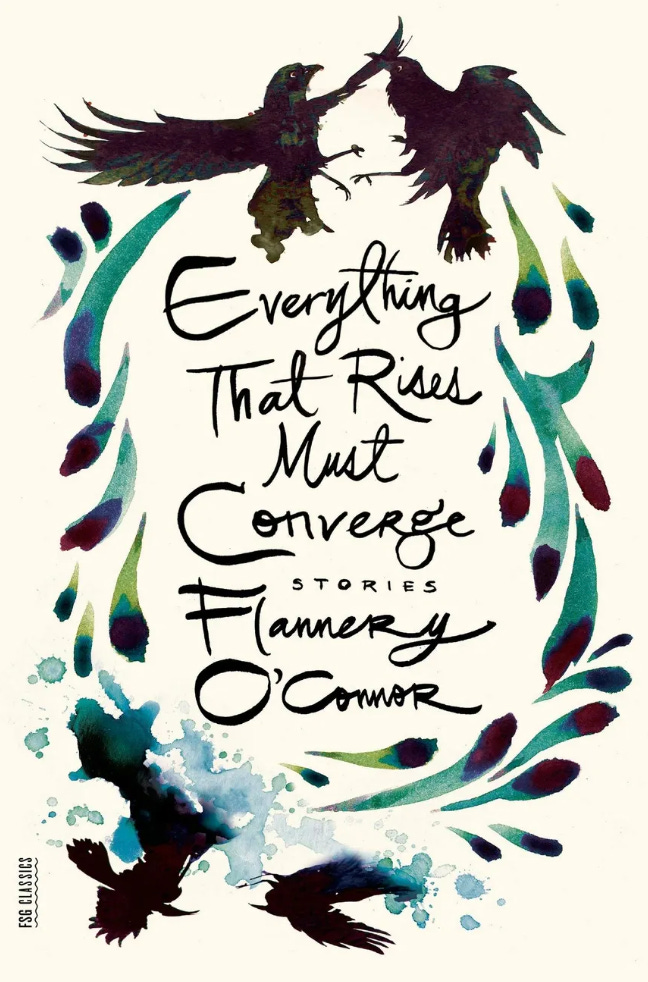Welcome to Flight School:
It’s time to take a deep dive on “Everything That Rises Must Converge.” If you haven’t read it, click the link, read, and come on back. If you have, let’s continue.
“Everything” is one of the last stories Flannery O'Connor completed before her death and emerges from a tumultuous period in American history. The Supreme Court's Brown v. Board of Education decision in 1954 mandated school desegregation, and by the early 1960s, the Civil Rights Movement was gaining powerful, violent momentum.
Closer to home, O'Connor battled lupus, a disease that killed her father and would kill her before her fortieth birthday. A devote Catholic, O’Connor was was drawn to Pierre Teilhard de Chardin's concept of the "Omega Point" where the universe evolves toward a point of maximum complexity and consciousness, where everything that rises must converge.
Cut to the quick socially and personally, and armed with this interest in faith meeting science, O’Connor’s pen was a sharp and relentless blade that produced this unforgettable and disturbing story.
Core Teaching: Arc and Symbolic Progression
The story follows Julian's failed attempt at moral and intellectual superiority and culminates in a devastating realization of his own emptiness when faced with his mother's mortality.
O'Connor builds this arc through escalating symbols and encounters—each element transferring energy to the next, creating unstoppable momentum.
The Hat:
“It was a hideous hat. A purple velvet flap came down on one side of it and stood up on the other; the rest of it was green and looked like a cushion with the stuffing out. He decided it was less comical than jaunty and pathetic. Everything that gave her pleasure was small and depressed him.”
Represents the mother's vanity and outdated values
Becomes a symbol of connection when the black woman boards wearing the identical hat
Transforms into an emblem of humiliation for both women
Becomes irrelevant in the face of mortality
The Bus Passengers and the Challenge to Worldviews:
“She sat forward and looked up and down the bus. It was half filled. Everybody was white. ‘I see we have the bus to ourselves,’ she said. Julian cringed. ‘For a change,’ said the woman across the aisle, the owner of red and white canvas sandals. “I come on the other day and they were thick as fleas—up front and all through.’”
White passengers (familiar territory)
The well-dressed black man (challenges mother's paternalistic racism while confirming Julian's superficial progressivism)
The black woman with the same hat (creates the "convergence" that neither Julian nor his mother can process)
The black woman's child (catalyst for the final confrontation)
Julian's Self-Awareness:
“‘That was the whole colored race which will no longer take your condescending pennies. That was your black double. She can wear the same hat as you, and to be sure,’ he added gratuitously (because he thought it was funny), ‘it looked better on her than it did on you. What all this means,’ he said, ‘is that the old world is gone. The old manners obsolete and your graciousness not worth a damn.’”
Begins with smug superiority and condescension toward his mother
Seeks to teach her a "lesson" by attempting to talk to the well-dressed black man
Fantasizes about extreme ways to shock her (bringing home a black woman)
Fails to recognize his own prejudices and limitations
Experiences a moment of terrible clarity when it's too late
The story's final line,"The tide of darkness seemed to sweep him back to her, postponing from moment to moment his entry into the world of guilt and sorrow," represent Julian's moment of convergence—when his intellectual posturing crumbles in the face of genuine human connection and loss.
This is the quintessential O'Connor end—a moment of grace delivered through shock and loss that shines light on a truth the protagonist was been blind to throughout. Julian's moment of clarity embodies O'Connor's Catholic understanding that grace often come through violence and suffering.
✍🏻Your turn: Prompts
When have you had a moment of moral superiority so intense, so powerful, so all consuming that you lost track of the deeper call to be kind?
What certain something cannot be forgiven and fosters deep resentment in you?
What person, in your life, harbors a powerful grudge against you and just barely tolerates you while also feeling the need to school you?
These prompts carry a certain brutality but if you can write about such things in your own life, you’re on your way to uncovering the deepest truths of the human experience. What you learn is creative-writing rocket fuel and will make your book a classic.
~ Jennifer,🐦⬛














Share this post